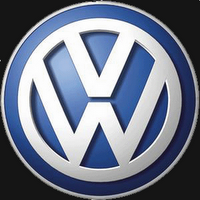Volkswagen’s US Production Plans Take Shape
 Volkswagen has some ambitious US sales goals and wants to surpass both GM and Toyota as the world’s largest automaker by 2018. However, the dollar’s weakness relative to the Euro (or the Euro’s strength relative to the dollar, as the case may be) makes it extremely cost prohibitive to sell European-built vehicles in the US. The fact that these are not luxury cars with the typical luxury car profit margins makes Volkswagen’s situation even more difficult.
Volkswagen has some ambitious US sales goals and wants to surpass both GM and Toyota as the world’s largest automaker by 2018. However, the dollar’s weakness relative to the Euro (or the Euro’s strength relative to the dollar, as the case may be) makes it extremely cost prohibitive to sell European-built vehicles in the US. The fact that these are not luxury cars with the typical luxury car profit margins makes Volkswagen’s situation even more difficult.
Now, VW doesn’t build all of its cars in Germany – in fact, it builds Volkswagen New Beetle, New Beetle cabrio and Jetta in Mexico for US sales – models that make up 56% of its sales in the US. But some mainstream cars like the Rabbit, GTI/R32, and Passat – plus the Touareg SUV – are built exclusively in Germany for US sales, which makes their value proposition against Asian and domestic competition questionable. Sure, German engineering is nice to have, but is it worth paying 10%+ more for a Volkswagen with questionable quality than a comparable Chevy, Ford, Honda, or Toyota?
Consequently, VW is faced with a handful of choices. They could de-content their German-built vehicles, but that would go counter to their “affordable premium vehicles” marketing message. Another option would be to expand their production in Mexico, but VW of America CEO Stefan Jacoby said that the factory in Puebla, Mexico “has come to its limit” and will not be further expanded.
That leaves the option of building a new assembly plant in the US (assuming VW would not consider building a plant in a low-cost country for US sales). Since there is already a significant German supplier and auto manufacturing base in the US South (and VW has confirmed that it will build a new plant – not where specifically, but that it would be somewhere in the Eastern time zone), and rumors are that VW has scouted sites in North Carolina, South Carolina, and Georgia, it seems likely that their new plant will be in one of those states. The new assembly plant will produce up to 250,000 units per year.
Mr. Jacoby announced today that Volkswagen is also planning to build engine and transmission plants in North America to support the new plant. He also added that VW will announce the site selection for its plant within six months. Mr. Jacoby said in Detroit last week that the new plant would likely produce the core products for the US lineup – which means the Passat (currently built in Europe), the Tiguan small crossover (also currently built in Europe), and a new future crossover. Basically, they want to produce as much of their US sales volume as they can in the US or Mexico to avoid the strong Euro/weak dollar problem.
The result of increased US production will lower the price premium charged for products like the Passat from the current 10% over rivals’ prices to 5% instead.


